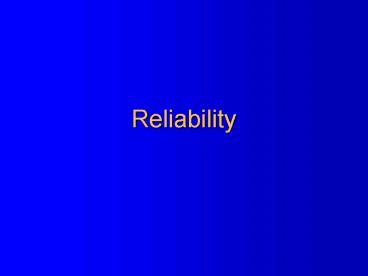Reliability PowerPoint PPT Presentation
1 / 24
Title: Reliability
1
Reliability
2
Reliability
- Concepts
- Load and strength distributions, infant mortality
and wear-out, failure rate curves, failure
probability analysis - Reliability Testing
- Failure Modes and Effects Analysis
- Identifying failure modes, failure mechanisms,
impact, probability and detection
3
Definitions
- Quality
- meets the specification when new
- Reliability
- continues to meet the specification through a
period of use - customer expectations vs specification
4
Variability
- Quality/Reliability intimately tied to varibility
- Origins of Variability
- Each instance of the product or service is at
least a little bit different - Use environments differ
- (Each customer has different expectations)
5
Infant Mortality
New units
After Infant Mortality
load
strength
load
strength
Probability of Occurrence
Failure region
Failure region
Applied or Failure Stress
6
Wear Out
After wear-out
New units
load
load
strength
strength
Failure region
Failure region
7
Bath Tub Curve
Infant Mortality
Wear out
Hazard Rate (r)
Bathtub Curve
Constant failure rate
Time (t)
8
Probability of Failing at a Given Age
From constant failure rate (exponential)
Failure Probability per unit time
From bathtub curve
Wear out
Infant Mortality
Time (t)
9
Cumulative Failure Probability
Eventually everything fails
1
From constant failure rate (1-exponential)
F
From bathtub curve
0
Wear out
Infant Mortality
Time (t)
10
Plotting Cumulative Failure on Weibull graph
paper
- Given a certain form for cumulative failture
- F(t) 1 exp -(t/?)b,
- we can rearrange and take natural logarithms and
get - Log log 1/1-F(t) b (log t log ?)
- If we plot Log log 1/1-F(t) vs log t, the
result is a straight line - Special graph paper exists that does these
transformations
11
Weibull Cumulative Failure Probability Plotted on
Weibull Graph Paper
b gt 1
b 1
.99
F
.63
(Scale based on log log 1/1-F)
b lt 1
t ?
.01
(log scale)
Time (t)
12
Weibull Interpretation
- b lt 1
- Implies infant mortality
- b 1
- Implies failures are random
- An old part is as good as a new part
- 1 lt b lt 4
- Occurs for
- Low cycle fatigue
- Most bearing and gear failures
- Corrosion or Erosion
- b gt 4
- Implies rapid wear out in old age
- Occurs for
- Wear-through
13
Reliability Testing
- Try the product in the lab before we sell it to
customers - Real use conditions
- Stress conditions
- Let real customers test it for us
- Friendly customers who know the risks (beta
test) - All customers
14
Exercise Experiment with Paper Clips
- Steps
- Practice technique by bending a paper clip to
failure. - Now for real, bend 2 paper clips to failure
- Record the number of cycles when the paper clips
failed - We will make a cumulative distribution on the fly
15
Exercise Experiment with Paper Clips
start
2 cycles
1 cycle
Etc.
4 cycles
3 cycles
16
(No Transcript)
17
Repairable and Non-Repairable Systems
- Non-Repairable
- Only need to track first failure
- Repairable
- Track Mean Time Between Failures (MTBF)
- Time to Repair
- Availability
18
Failure Analysis Processes and Unspoken CTQs
Perspective Customer Dissatisfaction
Perspective Customer Satisfaction
Quality Function Deployment
Failure Modes and Effects Analysis
Unspoken CTQs
CTQ Identification
Try not to miss anything that could go wrong
Focus on the critical few
19
Failure Analysis Processes and Unspoken CTQs
Perspective Customer Dissatisfaction
Perspective Customer Satisfaction
Quality Function Deployment
Failure Modes and Effects Analysis
Unspoken CTQs
CTQ Identification
- Many potential dissatisfiers do not show up in
CTQs identified by QFD - Example for dishwasher Does not catch fire
- FMEA enables management and engineers to give
appropriate focus on these
20
Failure Mode and Effects Analysis
- A structured engineering analysis performed on a
product or a process - Addresses the kinds, effects and severity of
failures - Results in actions that eliminate failure modes
or reduces their impact - Can reduce liability even for failures that are
not eliminated - Should be done after a specific design has been
developed, but well before the product or process
enters full production
21
FMEA and Risk
- FMEA is very much like a risk analysis
- Involves probability of occurrence of a bad thing
- Involves severity of consequences if the failure
does occur - Added element of FMEA compared to general risk
analysis - probability of avoiding detection
22
Failure Modes and Effects Analysis Elements
FMEA
What are the Failure Mechanisms?
What are the Failure modes?
What Is the Effect on The Customer?
How Likely Will It Be Detected Before It Hurts
the Customer
How Probable Is the Failure?
probability
How Serious Is the Effect
avoidance of detection
consequences
23
Risk Priority Scores
- Risk Priority Number Impact X Probability X
Detection - Impact Severity of effect
- Probability Likelihood of occurrence
- Detection Difficulty of identifying failure (if
it occurs) in tests or early trials before it
reaches the customer
24
Impact Score
25
Examples of FMEA Recommended Actions
- Address Impact
- Modify the design to have back-up elements or to
insure a graceful failure if one does occur - E.g. -- House electrical components that might
catch fire in fire-resistant metal boxes - Address Probability
- Modify the design to reduce the chance of failure
- E.g. Seal switches to keep moisture out
- Address Detection
- Design improved test that will reveal any
potential failure before product release - E.g. HALT with high humidity and over-voltage

